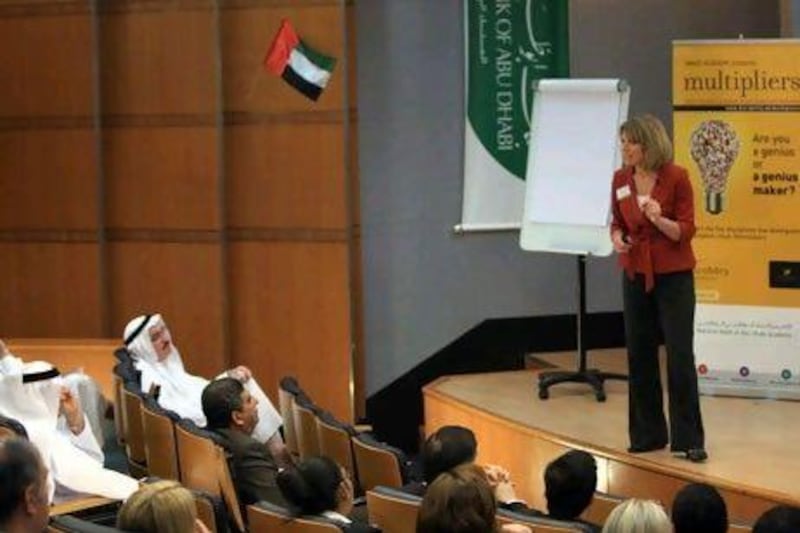Like many leaders, Khadija Dangor has only the best intentions. The head of reporting and reconciliation for a division office at the National Bank of Abu Dhabi (NBAD) says she tries to help, rather than hinder, the development of employees in her team. But recently, she discovered, that isn't always what happens.
"My own behaviour that I'd like to change is my tendency to do everything myself," says Ms Dangor. "I also need to listen more. Often my team comes up with good solutions, but maybe I'm too set in my own ways and don't listen to them as much as I should.
"When you start to reflect, you realise you are actually an accidental diminisher."
That phrase of being an "accidental diminisher" - or a leader who sometimes stifles the growth of others - didn't just pop into Ms Dangor's vocabulary on its own. The concept recently struck a chord with her, as well as an auditorium of some 50 NBAD bankers at the managerial level, during one of those guest lectures that usually leaves employees rolling their eyes.
Eye-rolling was at a minimum this time around as the audience engaged with the research question that the speaker, Liz Wiseman, tried to answer in both her talk and recent bestselling book, Multipliers: How the Best Leaders Make Everyone Smarter.
The question she has tried to answer, after studying more than 150 leaders in various businesses around the world, is simple yet crucial to the development of any workplace: why do some leaders amplify intelligence, while others drain or diminish it?
"I actually think the dirty little secret of corporate life is that people are really busy but secretly bored," says Ms Wiseman, who is president of The Wiseman Group, a leadership research and development centre based in Silicon Valley, California. "Where is this intelligence going, and can this intelligence be put to use?"
Ms Wiseman, who spent 17 years at Oracle Corporation as the global leader for human resource development and vice president of Oracle University, says "diminishers" tend to be know-it-all decision makers who micro-manage tasks and under-utilise talent. Her research has found that these kinds of leaders, whether they are a founder of a small business or senior executive for a technology firm or manufacturing plant, tend to utilise just 50 per cent of a person's intelligence or capability. In a random, admittedly unscientific poll of some of NBAD's managers in the audience, Ms Wiseman found that managers who had worked with a diminishing boss of their own put an average of just 25 per cent of themselves into that job.
"Multipliers", on the other hand, are talent magnets who create intense environments that require people's best thoughts and work. They also challenge and stretch an employee beyond their known capability, but don't create the kind of anxiety-induced stress that often shuts people down as deadlines approach. Among NBAD's managers, multipliers were able to get a full 90 per cent of their capacity.
Seeing such stark results will help managers at NBAD continue "building a learning culture", says Paula McManus, the bank's head of learning and development for its human resources group. "We've done a lot of management development training," she says. "People have the basics of what they should be doing, and this takes their understanding to the next level."
For managers such as Ms Dangor, though, only the first step of the process is complete. "Now, the big challenge is to apply the new approach," she says. "It's easy to spot something when you've done something wrong, but to proactively think of your approach and how you deal with people is something I want to change."






